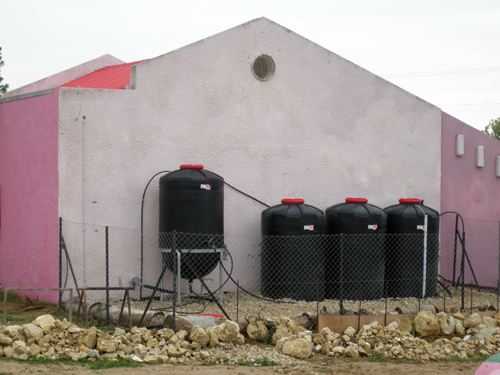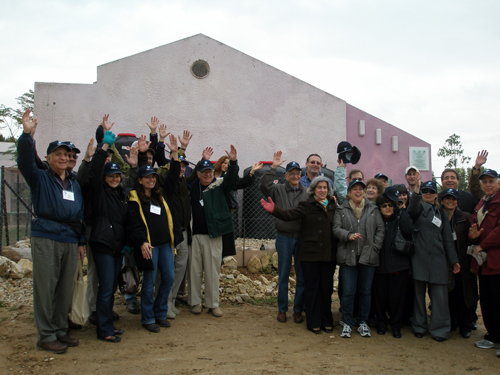 JNF DELEGATION–A delegation inspected rainwater harvesting facilities at
JNF DELEGATION–A delegation inspected rainwater harvesting facilities at
Kibbutz Shoval in the Negev Desert as part of a Jewish National Fund tour
spotlighting Israel’s critical water issues
_____________________________________________________
By Ulla Hadar
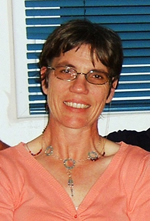 SDEROT, Israel — Almost two years have passed since my second visit to San Diego. At that time, editor Don Harrison of San Diego Jewish World approached and offered me the opportunity of becoming Sha’ar Hanegev bureau chief for the internet newspaper.
SDEROT, Israel — Almost two years have passed since my second visit to San Diego. At that time, editor Don Harrison of San Diego Jewish World approached and offered me the opportunity of becoming Sha’ar Hanegev bureau chief for the internet newspaper.
This job has propelled me in ways I could not have imagined at that time. It opened new horizons, taught me new skills and helped me to acquire knowledge of issues that were unfamiliar to me.
As a journalist I have been invited to experience adventures such as visiting an unopened prehistoric cave, going for a hot air balloon ride, and bike riding hundreds of miles to raise funds for Sha’ar Hanegev’s new missile-proof high school.
This week I was invited to join a delegation of Jewish National Fund professionals from North America, who were in Israel touring some of the projects run by JNF. As part of the tour the delegation arrived in the area of Sha’ar HaNegev and the neighboring municipality of Bnei Shimon.
On the JNF agenda Israel’s shortage of water is probably the most crucial environmental problem facing the country today. And it is obvious that this problem is a serious one, needed to be resolved as quickly as possible.
The water shortage is aggravated by the deteriorating quality of existing water resources that are even now overused. Accordingly, Israel is exploring the use of recycled wastewater in agriculture, which both reduces pollution while providing an additional water source for irrigation.
A year ago the project of building a new water system next to Sderot started, with JNF as a major partner. Leading the project is Meir Brockental, who met the delegation at the edge of the enormous hole that is to be the future water reservoir for the city of Sderot and some of the surrounding kibbutzim.
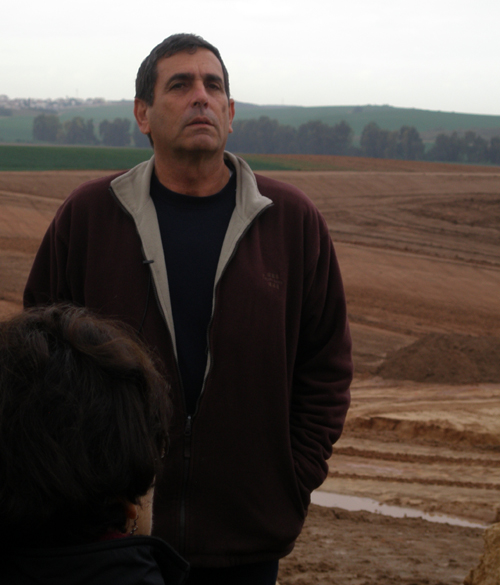 Meir Brockental at site of future reservoir
Meir Brockental at site of future reservoir
Meir explained to us: “The water shortage in Israel is an essential factor for our existence. Also as part of the peace process, the water has great importence for our neighbors of Lebanon, Syria, Jordan and the Palestinians. We have to progress as fast as possible in every direction to provide sufficient water supplies. One way is using grey water. The most Zionist thing to do today is to support or be part of any project connected to water supplies.”
The Sederot Recycled Water Reservoir has been designed with a capacity of one million cubic meters of treated wastewater from Sderot’s new sewage treatment plant. The effluents originate from Sderot, other communities in the region and local industry. The water is intended for irrigation of 125 acres of agricultural fields and orchards in the region.
Recycled water reservoirs are the ideal environmental response: they receive water from surrounding industries and communities and provide water for agricultural irrigation.
The growing amount of sewage in the town of Sderot and its surroundings (future estimates are 3.5 million cubic meters) urgently requires treatment. Surplus effluents flowing untreated cause serious environmental damage to the nearby Nahal Shikma Nature Reserve.
Before boarding a bus to visit another project, Russell Robinson, JNF’s chief executive officer, told those on hand: “Watching the development of this water reservoir near Sderot shows us how wonderful is the essence of life. To be able to grow crops – to feed a nation,the JNF encourage people to join the water projects so that all Water drops are caught in an attempt to continue the agriculture, to provide food for the people in the land of Israel.”
The tour continued to Kibbutz Shoval, a community that is part of the municipality if Bnei Shimon.
On the way between Sderot and Shoval, a distance of approximately 25 kilometers, Jodi Brodner, JNF’s communications director, told me a little of the vision of the JNF water projects.
“JNF decided about a year and a half ago to invest $100 million in campaigns connected to water projects in Israel– all projects running in the next 10 years,” she said. “This water fund is divided up into separate categories. One category is committed to build 40 new water reservoirs, one a river clean up, one searching into new sources of water aquifers, and a program in the school system collecting rainwater and reusing it as a water supply. This program was created by a teacher in Jerusalem. As of today 20 schools have joined the project called “Water saving and harvesting”.
f
The saving is about 75 percent in the schools that run this program. Part of the program is an educational curriculum to teach children about environmental issues such as how to save and reuse water. We are developing awareness in children of the water issues that exist in Israel today.”
Mevuot Hanegev School was established in 1963 at Kibbutz Shuvaland is one of the schools that today runs the “Water saving and harvesting” project. Mevuot Hanegev is an accredited ‘experimental’ school, dedicated to Humanity and the Environment –‘Tikkun Olam’ through ‘Tikkun Adam’ — and educates some 460 students from grades 7 through 12 study at the school, from a wide range of cultures and backgrounds: kibbutz children, children from development towns in the region, immigrants from the former Soviet Union and Bedouin children.
The school has an innovative curriculum focusing on sustainability, teaching the values of environmental awareness, social and moral sensitivity and civic responsibility.
Mevuot Hanegev in 2007 received official recognition from the Ministry for the Environment as an authorized ‘Green School’ in recognition of consistent excellence in the field of environmental education over many years.
Central issues addressed by Mevuot Hanegev as a ‘Green School’ include:
–Implementation of national and international policies regarding sustainable development.
–The increase of awareness and sensitivity towards environmental problems in the social context.
–Understanding environmental issues and learning to implement sustainability.
–Studying the optimal use of water in the experimental greenhouse.
These issues are addressed on a daily basis through formal education in the classroom, and also at the practical level through scientific experiments, growing plants, and creating alternative sources of energy.
When the JNF group arrived at the school, it was met by headmaster Ido Argeman, who praised JNF and Kibbutz Shoval’s sister community of Bangor, Maine. A small ceremony revealed the plaque commemorating the partners of this project.
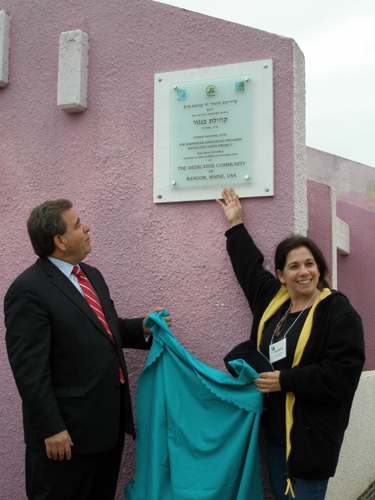 JNF’s Russell Robinson and Sharon Friedman reveal plaque on
JNF’s Russell Robinson and Sharon Friedman reveal plaque on
wall of Mevuot Hanegev School.
Argaman said one of the main features of the water system is collecting rainwater from the roofs of the school buildings into huge tanks. The water in the tanks then are used for flushing toilets, cleaning garden tools and irrigating small vegetable gardens at the school. The amount of rain falling in this Negev Desert community is limited, but four tanks have been placed to collect the water.
After touring this site the delegation left, continuing farther South deeper into the Negev.
More information on JNF and its projects is available on the website www.jnf.org
*
Hadar is Sha’ar Hanegev bureau chief for San Diego Jewish World
